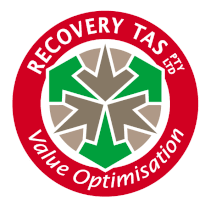Recovery TAS Pty Ltd, has always worked as a triple bottom line company, structuring its business activities, policies, and operating procedures to balance wealth generation, with social capital leading to societal behaviour change of ever increasing public participation in re-use, to conservation of natural resources and embedded carbon by ensuring sophisticated products, parts and materials remain in circulation (and out of landfill) primarily through the local market place for as long as practical.
Recovery Circular Hub (otherwise known as the Glenorchy Tip Shop) operations are highly systemised, reflecting both the whole, and parts of system thinking, i.e. order at each system level is the consequence of self organisation at a larger level - hence 33 departments of sale. From chaos of the mixed components of the waste stream, to order of 33 Departments of sales including subgroups as parts of the whole - presenting a re-use sustainable consumer smorgasbord for sale.
In 2015 the European Union transformed sustainability into circular economic theory and commenced structural reform of the market place with waste including the practice of re-use as its centre piece.
Also in 2015, and indeed on the other side of world Recovery TAS presented a paper at the annual Tasmanian Waste Management Association conference titled Re-use and Wealth Generation based on over 2 decades of operations. The paper explains how triple bottom line aspects are incorporated into the whole business model, and the performance results thereof.
Recovery Circular Hub (otherwise known as the Glenorchy Tip Shop) operations are highly systemised, reflecting both the whole, and parts of system thinking, i.e. order at each system level is the consequence of self organisation at a larger level - hence 33 departments of sale. From chaos of the mixed components of the waste stream, to order of 33 Departments of sales including subgroups as parts of the whole - presenting a re-use sustainable consumer smorgasbord for sale.
In 2015 the European Union transformed sustainability into circular economic theory and commenced structural reform of the market place with waste including the practice of re-use as its centre piece.
Also in 2015, and indeed on the other side of world Recovery TAS presented a paper at the annual Tasmanian Waste Management Association conference titled Re-use and Wealth Generation based on over 2 decades of operations. The paper explains how triple bottom line aspects are incorporated into the whole business model, and the performance results thereof.
| re-use_and_wealth_generation_2015.pdf | |
| File Size: | 581 kb |
| File Type: | |
Churchill Fellowship Study Tour 2019: The Circular Economy - A Blue Print for Innovative Waste Reduction Models
In 2019, Brad Mashman, Recovery Managing Director received a Churchill Fellowship to study innovative waste reduction models in Europe, Rena Dare, Recovery TAS Director also accompanied him.
The report below provides an overview of attitudes & policy of waste management in Australia, outlines the European Union process of structural reform to shift to a circular economy, and examines both policy and practices of circular economic development in Belgium, Sweden and the United Kingdom. The report is presented chronologically. It concludes with opportunities and findings for Tasmania & Australia.
In 2019, Brad Mashman, Recovery Managing Director received a Churchill Fellowship to study innovative waste reduction models in Europe, Rena Dare, Recovery TAS Director also accompanied him.
The report below provides an overview of attitudes & policy of waste management in Australia, outlines the European Union process of structural reform to shift to a circular economy, and examines both policy and practices of circular economic development in Belgium, Sweden and the United Kingdom. The report is presented chronologically. It concludes with opportunities and findings for Tasmania & Australia.
| a_circular_economy_blueprint.pdf | |
| File Size: | 5083 kb |
| File Type: | |
In November 2020, Brad and Rena were invited to submit an article to Economic Development Australia journal publication. The edition focused on the circular economy.
| eu_circular_economics_risk_tool___wealth_generation__economic_development_australia_journal_nov_20.pdf | |
| File Size: | 607 kb |
| File Type: | |

